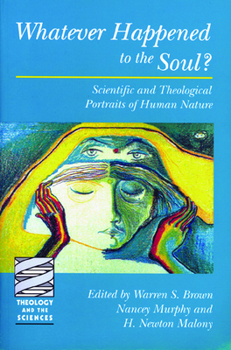Whatever Happened to the Soul?
Select Format
Select Condition 
Book Overview
Winner of Prize for Outstanding Book in Theology and the Natural Sciences As science crafts increasingly detailed accounts of human nature, what has become of the soul? This collaborative project strives for greater consonance between contemporary science and Christian faith. Outstanding scholars in biology, genetics, neuroscience, cognitive science, philosophy, theology, biblical studies, and ethics join here to offer contemporary accounts of human...
Format:Paperback
Language:English
ISBN:0800631412
ISBN13:9780800631413
Release Date:November 1998
Publisher:Fortress Press
Length:272 Pages
Weight:0.97 lbs.
Dimensions:0.6" x 6.0" x 9.0"
Customer Reviews
5 ratings
Critics do not appear to know the issues
Published by Thriftbooks.com User , 23 years ago
Quite simply, this is an extremely useful book.It is a decidely Christian rejection of substance dualism, something that has been wanting in a popular yet still academic format for some time now. This book argues persuasively that a dualistic mindset is not only unnecessary, but a real hindrance to Christian thought.As to the accusations of heresy given by some earlier reviewers - it seems that the reactions were a little ill-reasoned. In particular I would like to respond to Bruno D. Granger. Granger attacks the book because:________________________But even much more important, I think that Christian anthropology is fundamental for one of the most basic Christian dogma: the double nature of Christ, both human and divine. Traditionally it was thought that Christ had a human physical body and the third person of the Trinity as soul. But if humans are only physical beings without a (spiritual) soul then Jesus of Nazareth could not have been been both human and divine. ________________________I don't doubt that many modern Christian dualists also think this way - that Jesus' BODY could not have been the divine "part," it was His SOUL that was the divine nature. However, this is heretical as far as historical Christian Orthodoxy is concerned. it is the christological herey called "nestorianism," splitting the divine and human natures up into two distinct substances. This, naturally, makes the body of Jesus nothing more than human (i.e. not divine at all), and renders the atoning work on the cross totally useless. But the obvious reason to reject this dualistic heresy present by Mr Granger is that it basically denies the incarnation altogether. If the "divine" and "human" parts remained so separate, did God really become man at all? Did the word really become flesh?Glenn Peoples
No more Plato from the pulpit!
Published by Thriftbooks.com User , 23 years ago
People who have actually studied philosophy and are tired of hearing people rave on and on about saving "souls" can read this for direction and sound arguments. It is a good collection of experts in theological, scientific, and philosophical fields that are not trying to push materialism onto you and call it Christianity. These are seminary professors and Christian scholars who have done their homework and are trying to make the corrections necessary to share the faith in today's world. It accentuates religion's key characteristic of a new life in Christ. Makes a great partner to William James' "Varieties of Religious Experience." Theological Anthropology is much overlooked today, and Christians are taking flack. You do not have to believe in evolution, but you cannot deny modern neuroscience and psychology. This book delineates how that can be done.
Effective arguments against dualism
Published by Thriftbooks.com User , 24 years ago
It is unlikely that those who gave this book poor reviews understood the book at all. In fact, this book is NOT an attack on Christianity, and furthermore, several contributors to this volume are prominent theological scholars. Contrary to others' opinions, the authors take a non-reductive physicalist approach to human consciousness, rather than a purely materialistic view. The contention of the authors is merely that human consciousness is a physical entity; not some undetectable, supernatural phenomenon. Critics subsequently concluded that this contention equalled a disbelief in God. I beg to differ.
Excellent for student, theologian, scientist or pastor.
Published by Thriftbooks.com User , 25 years ago
This is the way books need to be written which integrate two different disciplines. A variety of authors from diverse areas of expertise which addressed a single issue. The arguement is well focused from beginning to end and each contributor genuinely interacted with the others. Finally we have a contemporary, intelligent book that deals a fatal blow to the banal notion of personhood as duality, and its more popular heresy, the immortality of the soul. As a pastor this academic volume has proven fruitful in teaching, preaching, writing and counseling. Yes, my pastoral colleagues, science I could understand and enjoy, as well as sink my teeth into. Yes, my scientific friends, theology with integrity, honesty and an appreciation for others contribution to an important topic.
A breakthrough volume for contemporary Christian theology
Published by Thriftbooks.com User , 26 years ago
Finally! Here is a book which combines sound biblical research, solid contemporary life sciences, well-reasoned philosophy, and rich theological construction. The authors describe the consonance between good biblically based theology and contemporary science in developing what they call nonreductive physicalist Christian anthropology. This book will be BASIC to sound contemporary theology in this area. Reading it is liberating, exciting, and affirming of the unity of faith and reason, religion and science, piety and devotion to learning. BUY IT, but above all READ IT.





